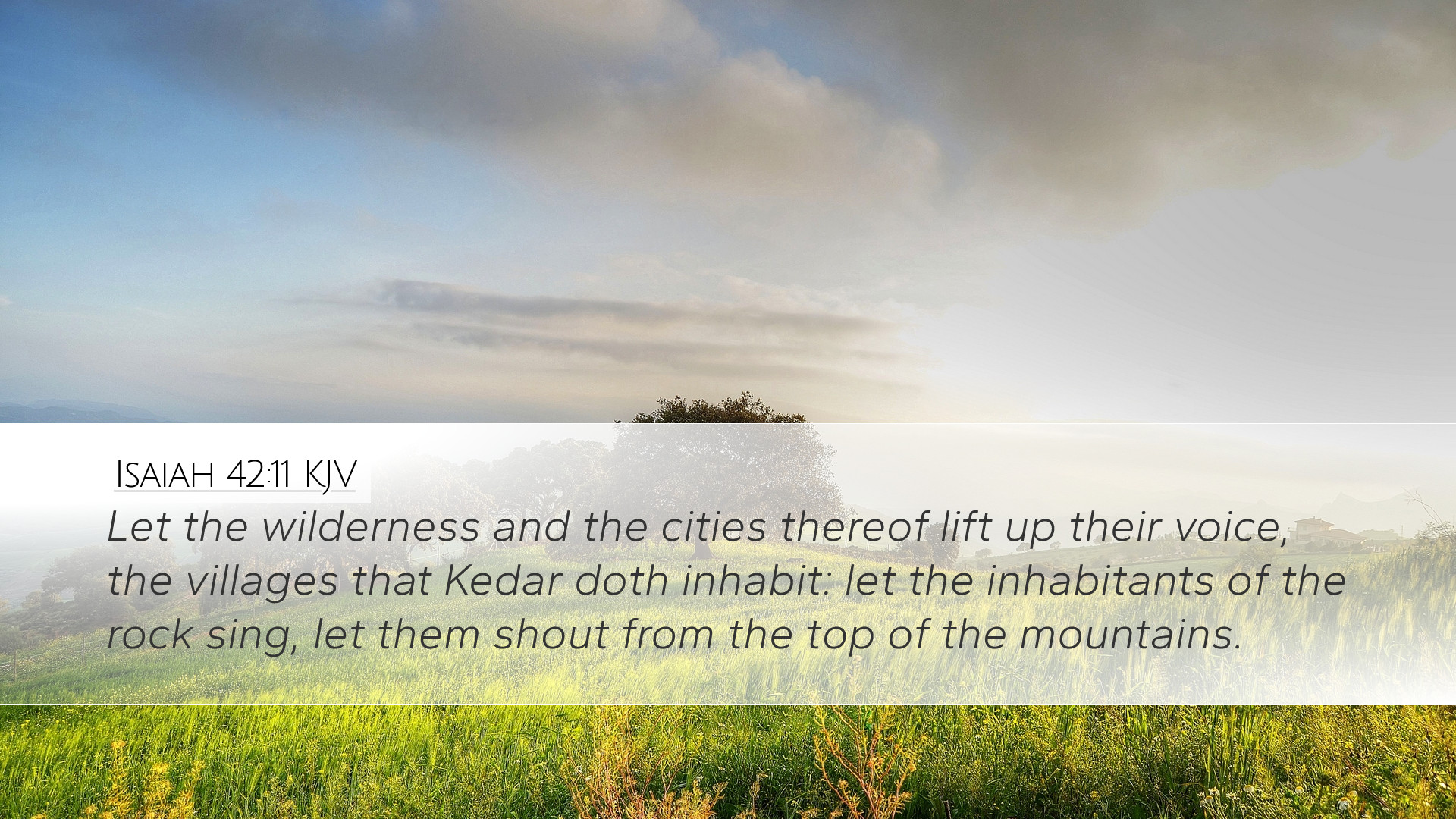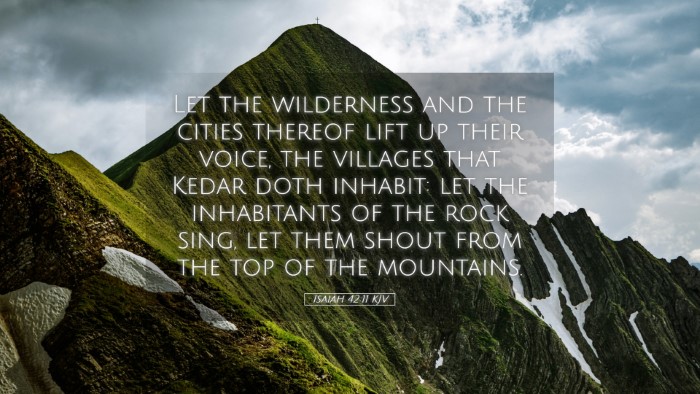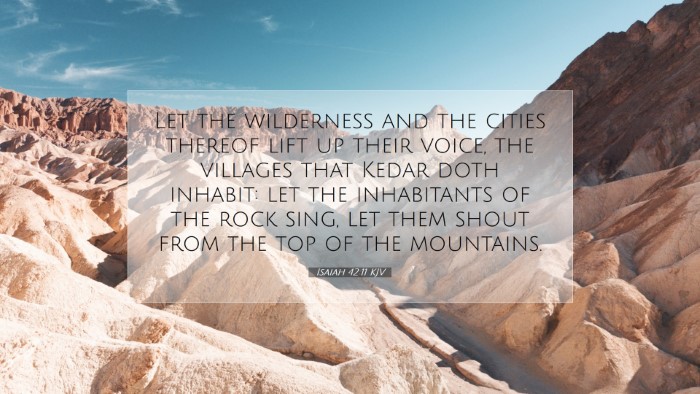Commentary on Isaiah 42:11
Isaiah 42:11 calls the inhabitants of the land to rejoice and sing for joy, emphasizing the importance of worship and praise in the life of God’s people. This verse is enriched by the insights provided by public domain commentaries, which offer a multi-faceted understanding of its implications.
Text of Isaiah 42:11
"Let the wilderness and its cities lift up their voice, the villages that Kedar inhabits. Let the inhabitants of Sela sing, let them shout from the top of the mountains."
Contextual Analysis
To grasp the richness of Isaiah 42:11, it is crucial to consider its context within the Book of Isaiah. Isaiah, a prophetic book bursting with themes of judgment, redemption, and hope, demonstrates God's sovereignty and grace through illustrations of restoration and the promise of the Messiah.
Prophetic Declaration
Matthew Henry notes that this verse serves as a prophetic declaration addressing both the Israelites and the surrounding nations. The call to rejoice in the wilderness symbolizes the transformation of desolation into a place of praise, attesting to God's redemptive ability.
Symbolism of Wilderness and Mountains
The "wilderness" represents spiritual desolation and emptiness. In biblical terms, wilderness is often a place of trial and testing. Yet, here it serves as a backdrop for unprecedented joy. The "mountains" denote stability and permanence, suggesting that those who once dwelt in sorrow will now experience profound joy that rises above their circumstances.
Thematic Insights
This verse embodies several themes critical for students and scholars, including:
- The Call to Worship: The imperative to “lift up their voice” instructs believers to actively engage in worship, both in personal and communal contexts.
- The Universal Scope of God's Salvation: Kedar and Sela are representative of the nations and peoples far removed from the covenant community, illustrating that God’s redemptive work expands beyond Israel.
- Joy as a Response to Salvation: Singing and shouting signify a heart response to God’s grace, emphasizing that proper worship is rooted in gratefulness and recognition of divine intervention.
Commentary from Notable Scholars
Matthew Henry's Commentary
Matthew Henry underscores the joy that arises from God’s promises, expressing that believers, even those who dwell in arid regions (the wilderness), will find reason to rejoice. He highlights that God’s deliverance is both comprehensive and inclusive, reaching even the most remote and desolate places. The act of singing is both a personal and communal expression of faith, emphasizing that those who experience God’s grace cannot remain silent.
Albert Barnes' Notes
Albert Barnes comments on the geographical significance of Kedar and Sela. He notes that these regions are symbolic of those who may be far off but are still called to experience the joy of salvation. Barnes emphasizes that true worship transcends cultural and geographical barriers, and the call to rejoice extends to all who feel estranged from God, inviting them into a relationship characterized by joy and praise.
Adam Clarke's Commentary
Adam Clarke draws attention to the imperatives in the verse, interpreting them as commands directed toward the people. He notes the joy reflected in singing, indicating a deep-seated transformation. Clarke underscores the significance of the mountains as places of proclamation, where the joy of the Lord can be declared to others. The call to worship is not merely a request; it is a vital part of living out one's faith.
Theological Implications
The implications of Isaiah 42:11 are multifaceted:
- Redemption and Restoration: The wilderness symbolizes not just physical barrenness but spiritual dryness. God's invitation to rejoice signifies hope and divine restoration.
- Evangelical Call: The inclusivity of the call to worship points to the Great Commission—God's desire for all nations to come to Him.
- Worship as Witness: The act of singing in the wilderness and on the mountains denotes a clear witness to God’s mighty works, thereby inviting others to join in worship.
Application for Today’s Believers
For pastors and theologians, Isaiah 42:11 serves as a profound reminder that worship is integral to the life of the church and individual believers. The text calls the community of faith to recognize its identity as people redeemed from desolation to joy.
Practical Applications:
- Promotion of Worship: Church leaders should create environments conducive to worship that reflect both exuberance and reverence.
- Evangelistic Outreach: Finding ways to reach out to those in ‘wilderness’ experiences is essential, ensuring that the message of hope is communicated to the marginalized.
- Community Engagement: Organizing community sings or gatherings that invite everyone to lift their voices can facilitate healing and unity through shared expressions of gratitude.
Conclusion
Isaiah 42:11 serves as a timeless affirmation of God’s ability to bring joy to the desolate. Through the compelling commentaries of respected theologians, this verse reveals a deep understanding of worship’s pivotal role in the life of believers. It recalls us to the core of our faith—celebrating God's redemption, both personally and collectively. As we engage with this text, let us lift our voices from the wilderness and shout the praises of our God from the mountains, proclaiming His greatness to all creation.


